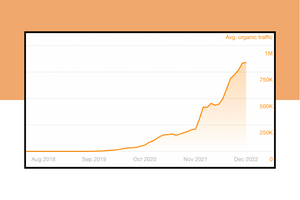Could 82 pages of content change your life?
For my guest this week, Samantha North, it did.
In 2 years, with no prior SEO knowledge, she built her blog to 75,000 monthly visitors.
And...it replaced her full-time income.
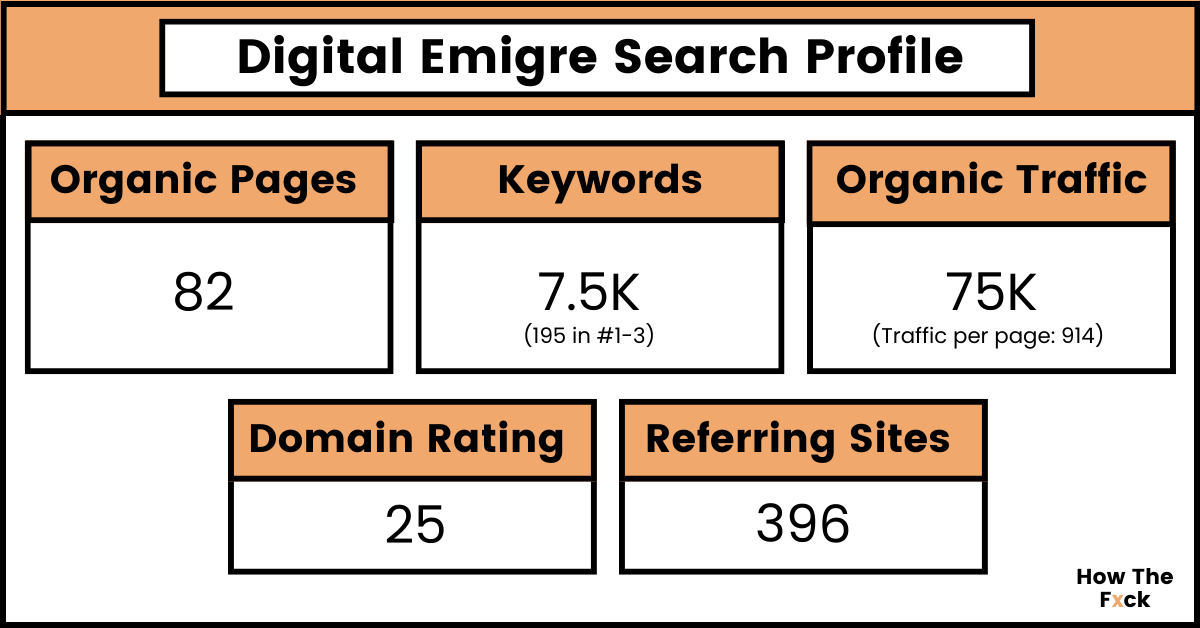
What I love about this story is that almost anybody can do it.
Samantha started off with just one blog post a week and over time it became a profitable business (although, in hindsight, she recommends that you frontload content creation to speed up the traffic growth.)
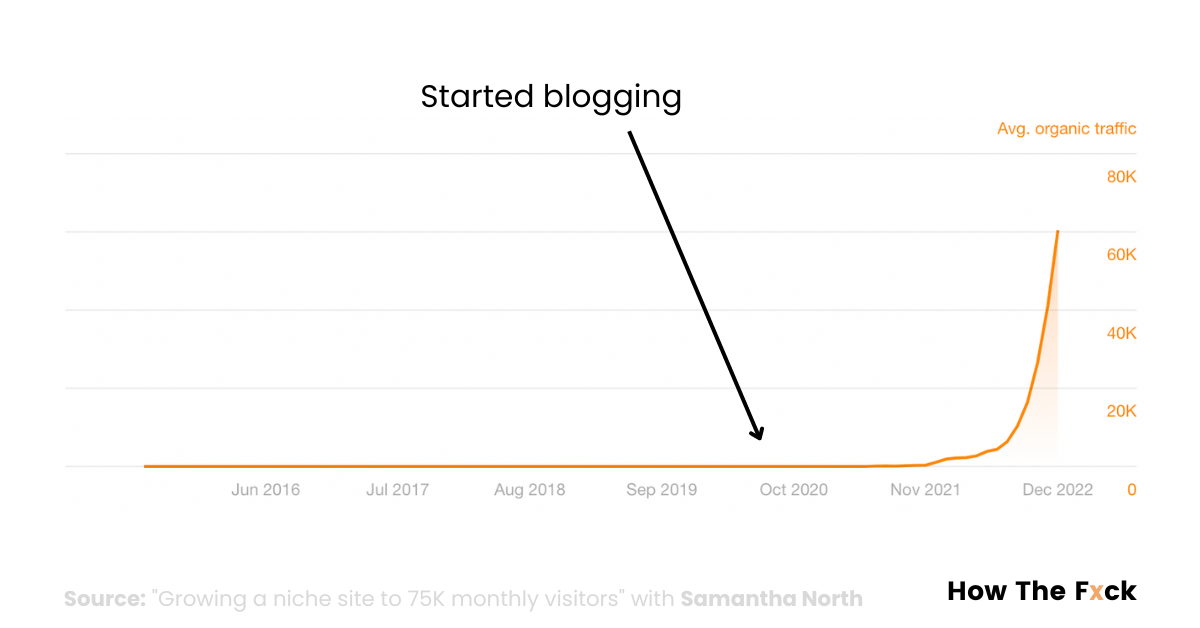
In this episode/guide, we deep dive into Samantha's story, including everything from choosing your niche to how to turn traffic into money.
Expect to learn:
⚡How to choose a niche: What you should write about is personal to you, but it also must be able to make you money.
⚡How to choose keywords: Why you should target long-tail keywords at the start. And why topic clusters are a critical framework.
⚡How to monetize your site: Different ways to monetize your blog and their pros/cons. Including a step-by-step on how to set up a consultation service.
⚡Secret sauce: Sam shares three key things she would do differently next time to accelerate this success.
Case Study Details
Samantha started writing Digital Émigré post-Brexit, to help investors and remote workers get EU citizenship.
Her blog targets keywords like "Easiest Countries to Get EU Citizenship" with strategies and advice for those wanting to emigrate.
In just two years, her traffic began to boom. In this case study, we focus in on Samantha's exact process and how you can get the same results in a shorter amount of time.
Start date: Brand new website launched in late summer 2020 - 0 traffic, 0 authority, 0 income
Current results (December 2022):
- 3k visitors per day, around 75,000 visitors per month
- Average £7,000 per month
Revenue breakdown:
- 25% ad revenue (Around $1500 passive income per month from advertisers like Ezoic)
- 50% referral partnerships (resulting in the occasional 5-figure payout)
- 20% consulting (more on that below)
- 5% affiliate programs
Here’s a breakdown of how Samantha achieved these exceptional results:
How to choose a website niche
There are three questions you need to answer when choosing a niche:
- Is this niche monetizable?
- Am I interested in this niche?
- How competitive is it?
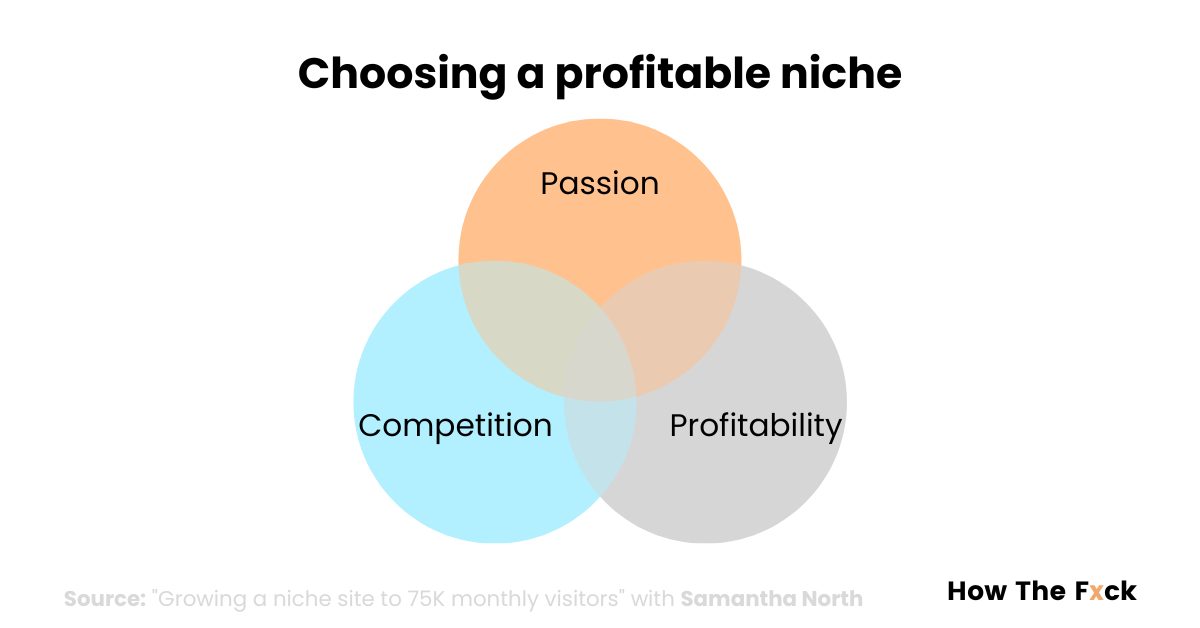
Does the niche have monetization potential?
The best way to check whether a niche has monetization potential is to examine the websites of the existing blogs and websites in that niche.
Look for signs that your future competitors are earning money off of their websites.
- Do they have display ads?
- Do they have affiliate links?
- Do they offer coaching?
- Do they offer subscription-based communities?
- Do they offer digital products?
If the answer is yes to some or all of these questions, then congrats! 🎉 You’ve discovered a monetizable niche.
Another pro-trick here is to start with monetization and back it into traffic. For example, is there a product you absolutely love that's recently come out with an affiliate program?
Trying to look for keywords that would drive sign-ups to that product.
Are you passionate about the topic?
“Are you going to be interested in this long enough to maintain the pace of all the writing you’ll need to do to make this a success, to make this rank?” - Samantha North
If you're doing it yourself, growing a blog requires a lot of time, patience, and focus.
If you choose a niche with high monetization potential but one that doesn’t interest you much, you might get bored before finishing the first 20 blog posts.
The key is finding a balance between your passion and interest and the monetization potential.
If you're passionate about the topic, you'll have fun expanding your content offering to include a video series or online course—both great ways to make money from traffic.
How competitive is the niche?
Like all good businesses, there's a balance to be had been demand and existing competition.
Choosing "personal finance" may seem like a great idea. For one, it's easily monetizable because there's a whole ecosystem of personal finance businesses wanting to sell to your audience.
However, because of this, the search results (SERPs) are dominated by huge companies that have invested years and $millions in winning.
Your goal when choosing a niche is to find untapped opportunities. Where there's a significant search volume that you can keep writing about the topic for a long time. But, the SERPs are not yet dominated by high-authority websites.
When assessing competition it's important to bear in mind that tools like Ahrefs don't paint the full picture with their DR score:
Developing your early content strategy
Once you have a (monetizable) niche you’d like to explore, it’s time to come up with a content strategy.
That means first answering the questions:
- Who am I writing for?
- What am I writing about?
- Which keywords should I tackle first?
- What quality, word count, and visual experience will help me win?
- How will it all fit together?
1. Find the right topics
One thing that was pivotal to the success of Digital Émigré (DÉ) was how it solved real-world problems for its visitors.
People were looking into how to gain (or keep, in the case of UK residents such as Samantha) EU citizenship, and DÉ was there to answer all of their questions.
When planning out the topics you’d like to cover on your blog, think about the problems you can solve for your target audience.
Especially pay attention to the problems you’ve had personal experience with and that you successfully overcame. These are great places to start.
2. Target long-tail keywords
A key mistake Samantha made early in her DÉ journey was targeting high-volume, highly competitive keywords.
For a brand new website, these were way too competitive to rank high for.
“I tried to target the keyword "online business" when the blog was new. Of course, it didn’t go anywhere. So when I look back at the first 5-10 posts on there, I can see that they’re quite problematic in terms of SEO.” - Samantha North
A key learning for Samantha was that long-tail keywords are much easier to rank for when you're trying to gain a foothold on Google.
Here's my guide to using Ahrefs to discover long-tail keywords:
3. Analyze competitors
Taking a look at what the competitors in your niche are ranking for is an excellent way to discover new keywords, especially new long-tail keywords.
Simply pop their domains into an SEO tool of your choice and check out the organic keywords they rank for.
Look for low keyword difficulty (KD) keywords with a decent search volume for your niche that you can take advantage of.
Here's a mini guide:
4. Create topic clusters
According to Google Search Quality Rater Guidelines, a high level of expertise, authority, and trustworthiness (E-A-T) is crucial for ranking high in Google search results.
An excellent method of achieving high E-A-T is by creating topic clusters.
Topic clusters typically consist of one pillar page that provides a broad overview of a topic and a series of subpages (spokes pages) that branch off of the pillar page. These subpages cover each aspect of the broad topic in more depth.
Samantha first discovered topic clusters when she made one by accident.
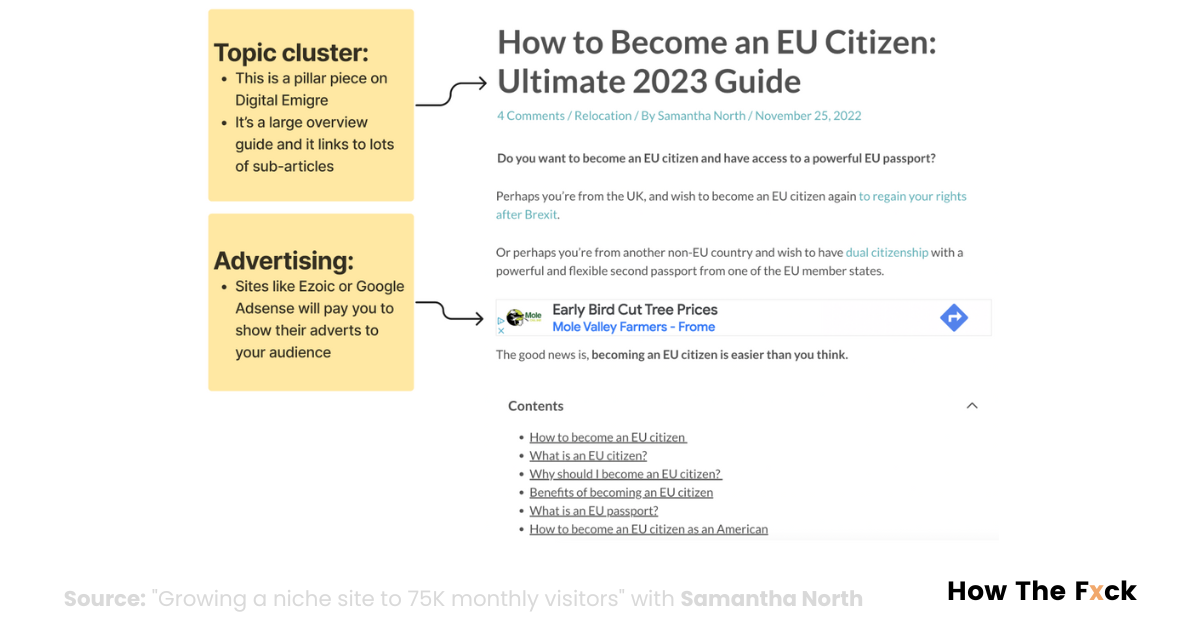
Example: Samantha's guide to becoming an EU citizen became an excellent pillar page for the subpages of how to obtain citizenship of individual EU countries.
When planning out your content strategy, make sure to create at least 4 to 5 topic clusters (consisting of 1 pillar page and 10 to 20 spokes pages each) to start gaining topical authority.
FAQ: How often should you publish new blog posts
Armed with problem-solving topics, long-tail keywords that are ripe for the picking, and a few kickass topic clusters, you’re ready to start writing!
But how often should you post new content to your website?
The answer is as much as humanly possible.
For (at least) the first 3 months of growing your blog, the goal should be to publish a blog post every day.
Get your first 50 blog posts on your website ASAP.
Samantha didn’t do this for DÉ but highlights it as another one of her beginner mistakes.
If she had frontloaded her content and published around 50 posts as soon as possible, the growth of her website would’ve probably been faster.
How to monetize your blog
Samantha offers first-hand insight into different ways you can monetize your blog:
- Display ads (through platforms such as Ezoic or Mediavine)
- Affiliate marketing
- Coaching or consultation services
- Referral partnerships
- Digital products
Which of these will make sense for you largely depends on your niche.
Once again, taking a peek at your competitors is a good move. What monetization methods work for them will probably work for you, too.
Coaching and consultation services: Step-by-step
Before Digital Émigré really took off, Samantha relied on consultation services to earn income.
Coaching and consultations are good options at the start of your blogging business because you don’t need much organic traffic to bring in customers. You can promote your services through your Linkedin or Twitter profiles.
Here’s a step-by-step process of how Samantha maximized her earning potential by offering consultations for people looking to move to the EU:
- Promoted her services on Linkedin and Twitter by repurposing her blog content into posts for these platforms.
- Sprinkled CTAs for her services throughout relevant blog posts on her website.
- Set up a landing page with SavvyCal integrated into it. That lets customers schedule an appointment and pay for it in advance.
That’s it!
As for how effective this can be as an income channel - at the start of DÉ, Samantha earned around $12k from her consultation services alone.
Grow faster: 3 final pieces of advice
If she was doing the same thing all over again now (as she is with her new blogging ventures), what would Samantha do differently?
What would she recommend to people just starting out with niche blogging?
- Don’t bother with custom website design - In the interest of saving money and speeding up the process, a simple WordPress theme does the trick.
- Build backlinks from the beginning - Be more intentional about building backlinks through HARO. Pitch more guest posts. Build relationships in your niche. Read our guide to PR backlink building here.
- Delegate and outsource as soon as you can afford it - Outsource the writing (to a good writer), hire an outreach person or a VA. Anything that will take some burden off your shoulders is worth investing in.
And finally, Samantha cannot overstate the importance of being patient. Growing a niche blog won’t be fast and it won’t be easy if you're doing it alone.
Sam recently wrote a great LinkedIn post with 11 things she would do differently next time:
But you have to stick to it to reap all the benefits. So just keep putting your content out there!

